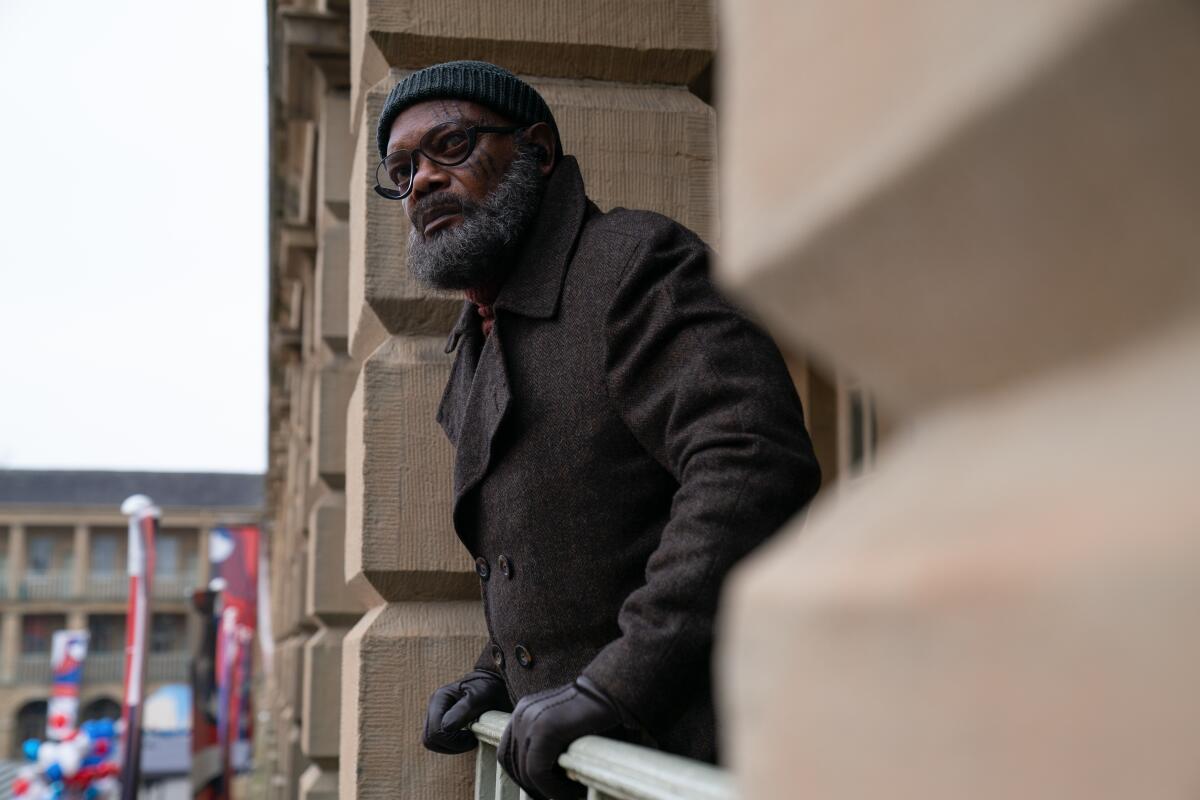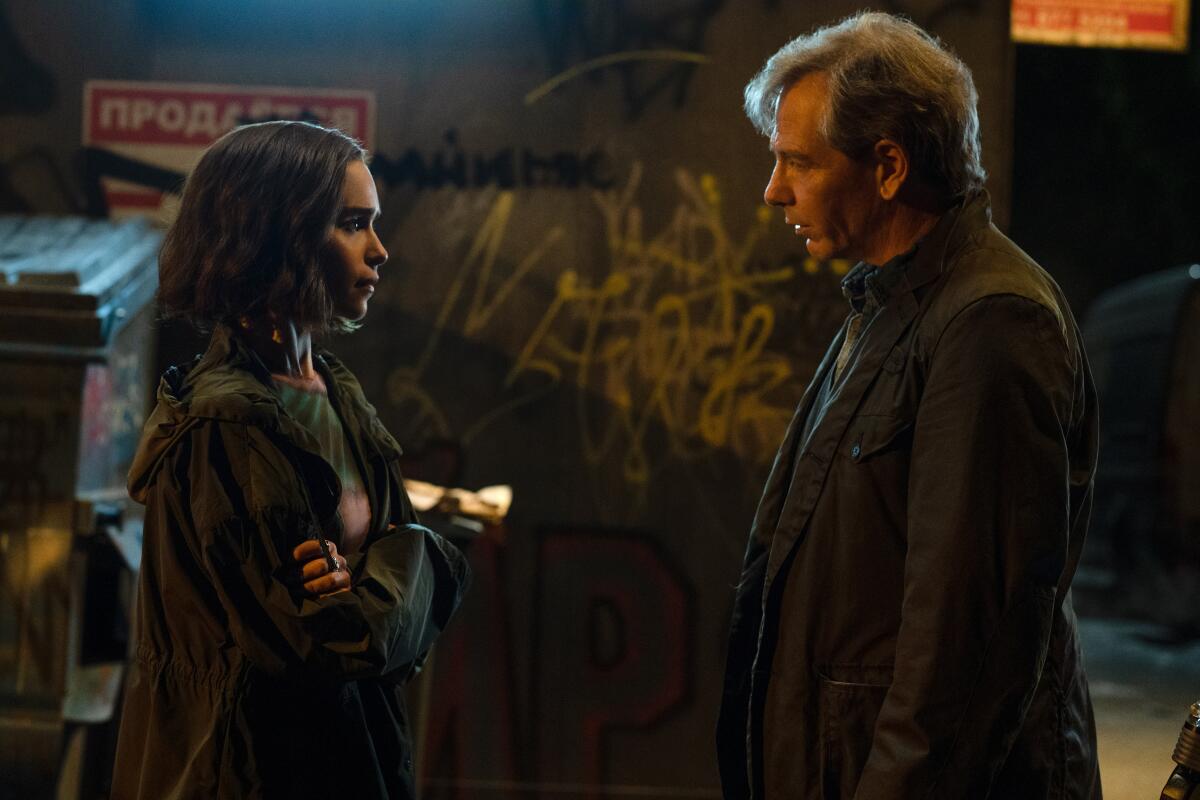‘Secret Invasion’ review: A closer look at Nick Fury and the Skrulls

- Share via
I’ve said it before and, barring the collapse of the franchise, will have cause to say it again, but I find the Marvel Television Universe parsecs more interesting, watchable, smarter, affecting and fun than its big-screen, big-everything theatrical component. With more time to tell a story and less money to obscure it in special effects, the TV shows invest more in ideas, in character, in novel ways of approaching a story. There’s more talking, less fighting. The fate of the universe is, after all, less interesting than the fate of a person, since the universe will obviously outlast us, and people are notoriously fragile.
“Secret Invasion,” which premieres Wednesday on Disney+, centers on Nick Fury (Samuel L. Jackson), who came into being in the comics as a World War II Army sergeant and, hitching a ride on the late ‘60s rage for spies, was shortly promoted to a contemporary secret agent (“of S.H.I.E.L.D,” originally for Supreme Headquarters, International Espionage and Law-Enforcement Division — the age loved an acronym).
In the ensuing six decades of elaboration, retconning and world-building, he has become the man who conceived the Avengers, Marvel’s answer to D.C.’s Justice League; that pack of superheroes are currently off-world doing … something or other … which leaves “Secret Invasion,” its alien characters notwithstanding, refreshingly life-sized. I can’t say what noisy wonders the endgame — or even the middle game — might hold, only two episodes having been released for review. But it’s generally true of Marvel TV series that character packs the punch, and not the punching itself. There is punching, but nothing that could take down a building.
As the series begins, Fury has been up in a space station for some years, ostensibly working on a defense system, but, more to the point, he has been in hiding, having had a “crisis of faith.” He has also been dead, then alive, one of those MCU complications that are unavoidably addressed, yet essentially unimportant. (Callbacks and Easter eggs aside, you don’t need to know much about what’s come before to understand what’s happening now among the various good guys, bad guys and those who are a bit of both.)
But he is made for the moment, having had a sympathetic history with the Skrulls, a shape-shifting race of interplanetary refugees, and back on terra firma. (See: “Captain Marvel,” in which Jackson was de-aged a quarter century into the 1990s.) The Skrulls are now well established on Earth, to what extent only the Skrulls know, as they spend most of their time looking like us, and only a handful of humans are aware that they’re here at all. Though they shift shape, they tend to stick with a single face in the present story, for purposes of audience identification, and less time in the makeup chair.

But they are not a united people. The tactical, factional and generational divisions common to real-world liberation movements provide a template for “Secret Invasion.” On the one hand, there is the old guard, represented by General Talos (Ben Mendelsohn), who is all for assimilation, which even Fury thinks is unlikely. “Humans can’t coexist with each other, Talos — you’ve been here long enough to know that,” says Fury. “There is not enough room or tolerance on this planet for another species.”
On the other, there are those whose patience have been exhausted and have been waiting since the end of “Captain Marvel” for Fury to fulfill his promise to find them a planet to call their own. They’re led by Gravik (Kingsley Ben-Adir), who “preys on the collective rage of young, displaced Skrulls,” whose ranks include Talos’ own daughter G’iah (Emilia Clarke); his plan — long popular among the unfriendly fictional space races — is to take over the planet from its current residents. (It’s the old movement chant, “We want the world and we want it now,” literally.) The irony of refugees creating new refugees is perhaps lost on him.
The series has been constructed, from its camera moves to its soundtrack, as a kind of post-Cold War Cold War thriller, set in and around Moscow, whose backwardness makes it feel less than modern. Except for the cellphones, this might have taken place in the ‘90s or ‘80s or ‘70s. Apart from the Skrulls, who shift some shapes right off the bat, and some fancy machinery hidden in an abandoned nuclear plant, there is not much science in its fiction, at least to begin with — nothing more advanced than might be encountered in, say, a Pierce Brosnan Bond flick. With just a little massaging, the plot could support a story without any aliens at all — indeed, it often has. Much of what’s here is so familiar from the Big Book of Spy Stories that in a generous spirit, one might call it a knowing homage, and in a less generous spirit, a lazy pastiche.

A plot in which a third party is sowing discord between two superpowers to its own advantage has, among other iterations, animated at least two Bond films — “You Only Live Twice” and “Tomorrow Never Dies” — as well as the Jack Ryan feature “The Sum of All Fears.” Stories in which an enemy walks among us — be they aliens in human form or ordinary human terrorists — have been used as many times as there are letters in this paragraph. Ditto the suggestion that some very important people might not be who they seem.
Given the standard plotting — again, one must add, so far — what matters here is character, and a certain charismatic soulfulness the films are too busy to ever really establish. As Fury, Jackson — gray-bearded, lumbering (and limping) through the Russian night in a heavy overcoat and watch cap — wears his age like age. Charming and intimidating, he has the air of a weary hipster; a saxophone or a paintbrush or a sheaf of poetry would not be out of place in his hands. Other characters continually point out that he is not the spy he used to be. (“He’s just vapors,” says Gravik, neither intimidated nor charmed. “Old.”)
As Talos, Mendelsohn, too, projects a kind of worn nobility and makes a good foil for Jackson. One of their scenes together, talking in a train compartment, moves from Fury’s childhood reminiscence (“Coming out of Alabama, we always had to ride in the colored car ... We couldn’t go in the dining car, so we brought fried chicken, white bread, deviled eggs and pound cake in a shoe box”) before sliding sideways into more crucial current business between them. It’s the kind of low-key but critical exchange the series does well, as in Jackson’s meetings with Olivia Colman, dressed in red, as a chirpy, cold-blooded British intelligence chief.
Also here are Cobie Smulders as agent Maria Hill; and Don Cheadle as James Rhodes, out of his War Machine gear and into a suit and tie as the American president’s right hand. (“Men who look like us don’t get promoted because of who our daddies know,” says Fury, bringing the real world into the MCU.) Most of them seem a little tired. (The characters, I mean, not the actors.)
Among the upstart Skrulls, Ben-Adir conveys the cockiness of a young firebrand, peppered with the smugness of a classic thriller villain. An undercurrent of sadness runs through Clarke’s performance, her character torn between one side and the other.
Crossovers, cross-promotions and guest shots being key to the business plan, one might predict with confidence an appearance of Brie Larson‘s Captain Marvel somewhere down the line. (Or almost any tangentially related character, for that matter.) For the moment, the series is happy with its alleyways, dark bars and backrooms, its more or less conventional fisticuffs and firefights, chase scenes, interrogations and searches. It’s a decent beginning to who knows what. Like spies on a stakeout, we will wait and see.
‘Secret Invasion’
Where: Disney+
When: Any time, starting Wednesday
Rating: TV-14 (may be unsuitable for children under the age of 14)
Starring:
Samuel L. Jackson
Ben Mendelsohn
Cobie Smulders
Emilia Clarke
Olivia Colman
Kingsley Ben-Adir
More to Read
The complete guide to home viewing
Get Screen Gab for everything about the TV shows and streaming movies everyone’s talking about.
You may occasionally receive promotional content from the Los Angeles Times.







